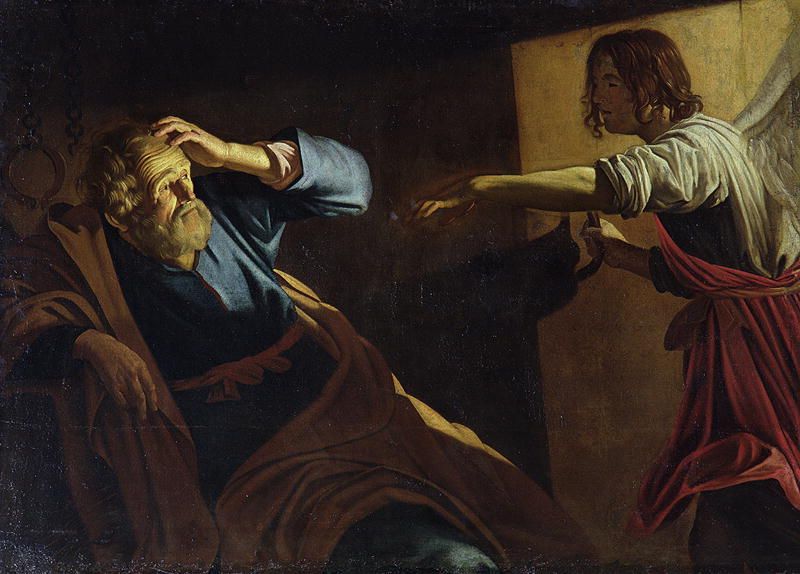Sunday
I was thumbing through my Collected Poetry of Denise Levertov yesterday and came across a wonderful poem that I had forgotten about. My late friend Dana Greene, in her biography of Levertov, spoke of the poet’s focus on “primary wonder,” and what I love about Levertov is that, for her, such wonder is not the end but the beginning. It’s after we experience divine revelation that the real work begins.
That’s how it was for the disciples after they encountered the risen Jesus and how it is for Peter in the poem that I share today. “St. Peter and the Angel” is a reflection on this episode, recounted in Acts 12: 5-11, about Peter’s miraculous escape from Herod’s prison. Here’s the passage:
Peter was therefore kept in prison, but constant prayer was offered to God for him by the church. And when Herod was about to bring him out, that night Peter was sleeping, bound with two chains between two soldiers; and the guards before the door were keeping the prison. Now behold, an angel of the Lord stood by him, and a light shone in the prison; and he struck Peter on the side and raised him up, saying, “Arise quickly!” And his chains fell off his hands. Then the angel said to him, “Gird yourself and tie on your sandals”; and so he did. And he said to him, “Put on your garment and follow me.” So he went out and followed him, and did not know that what was done by the angel was real, but thought he was seeing a vision. When they were past the first and the second guard posts, they came to the iron gate that leads to the city, which opened to them of its own accord; and they went out and went down one street, and immediately the angel departed from him.
And when Peter had come to himself, he said, “Now I know for certain that the Lord has sent His angel, and has delivered me from the hand of Herod and from all the expectation of the Jewish people.”
Somewhat like Dostoevsky’s Grand Inquisitor, Peter realizes that our most challenging task is handling the freedom we are granted. While the Inquisitor speaks of the fear, however, he omits the joy that comes with embracing that freedom. When we can no longer feel the angel, that’s when we hear our own footsteps and experience the “long street’s majestic emptiness”:
St. Peter and the Angel
By Denise Levertov
Delivered out of raw continual pain,
smell of darkness, groans of those others
to whom he was chained–
unchained, and led
past the sleepers,
door after door silently opening–
out!
And along a long street’s
majestic emptiness under the moon:
one hand on the angel’s shoulder, one
feeling the air before him,
eyes open but fixed . . .
And not till he saw the angel had left him,
alone and free to resume
the ecstatic, dangerous, wearisome roads of
what he had still to do,
not till then did he recognize
this was no dream. More frightening
than arrest, than being chained to his warders:
he could hear his own footsteps suddenly.
Had the angel’s feet
made any sound? He could not recall.
No one had missed him, no one was in pursuit.
He himself must be
the key, now, to the next door,
the next terrors of freedom and joy.


